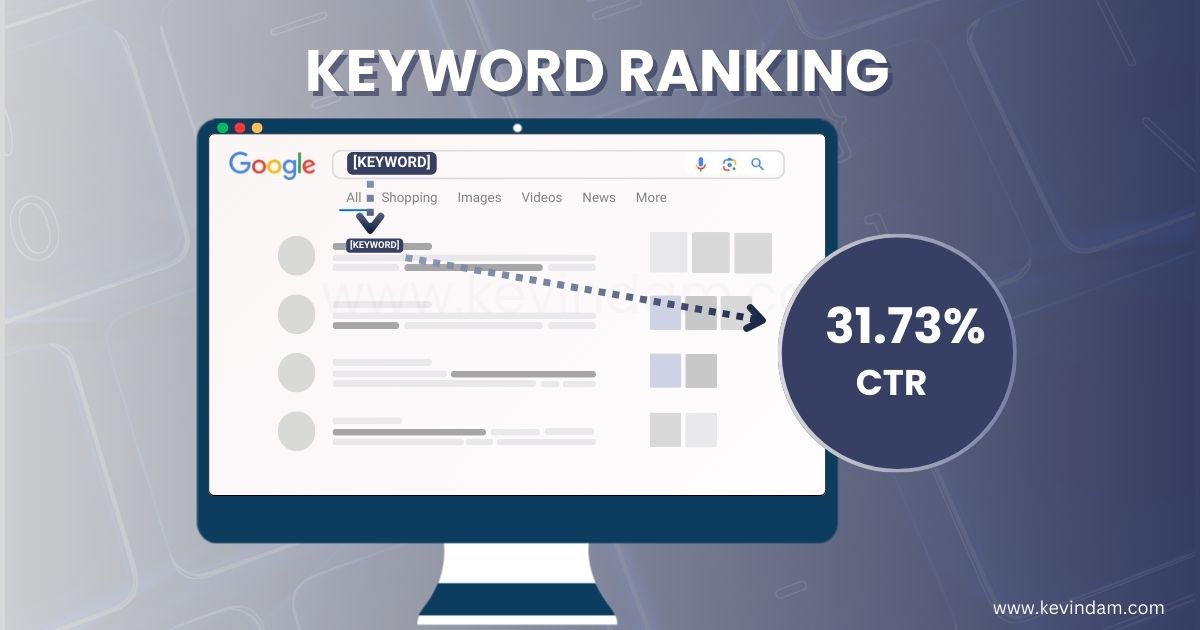
Last Updated August 15, 2024
Comprehensive Guide to Keyword Rankings: Strategies to Improve and Track SEO Success
Keyword rankings are your web page’s positions in search engine results based on specific user queries. For example, ranking third for the term “best smartphones” means your website is the third option when users look for this phrase. Your ranking level dictates your web page’s visibility and substantially impacts how much organic traffic flows toward you.
Achieving high-ranking positions isn’t a matter of chance but a result of strategically optimising your site according to Google’s algorithms. These algorithms evaluate your content’s relevance, authority, keyword usage, and other critical factors like quality backlinks and user experience, which determine your page’s rank.
Gaining top positions in search engine results is complex. It requires staying updated with constantly changing algorithms and learning strategies that may initially seem counterintuitive. For instance, you must focus not only on the keywords themselves but also on their contextual relevance within your content.
This article is about improving your keyword rankings and involves optimising your website’s content with relevant keywords, creating high-quality backlinks, and regularly monitoring and adjusting your SEO strategies. It also ensures that your website’s core web vitals are optimised, which can contribute to better keyword rankings over time.
What is Keyword Ranking?
Keyword rankings refer to the position of a webpage in search engine results for specific queries. It’s like finding a book in a library – the higher it is on the shelf, the easier it is to find. For example, if your website ranks third when someone searches for “best smartphones,” your page is the third result people see. We aim to be among the first results because people are likelier to click on the top few results.
So, why does this matter? Well, think about how we use search engines. When was the last time you clicked past the first few results? According to recent statistics, the top 3 search results on Google receive 75.1% of all clicks. Additionally, the first position on Google search results has an average click-through rate of 31.7%. This makes it alarmingly clear how important it is to rank as high as possible for relevant search queries.
Imagine standing on a busy street corner, trying to get people’s attention. The further back you are, the fewer people will notice you. On the internet, where so much information competes for attention, being front and centre matters greatly. That’s where keyword rankings come into play. Our goal is to ensure that potential visitors easily find our web pages. The better our keywords rank, the more likely people are to click on our website—and with more clicks comes more organic traffic.
Understanding keyword rankings and their significance gives us a solid foundation to build upon as we explore different strategies to improve and track them effectively in our SEO endeavours. Now, let’s explore how search engines determine these rankings.
Role of Search Engines in Rankings
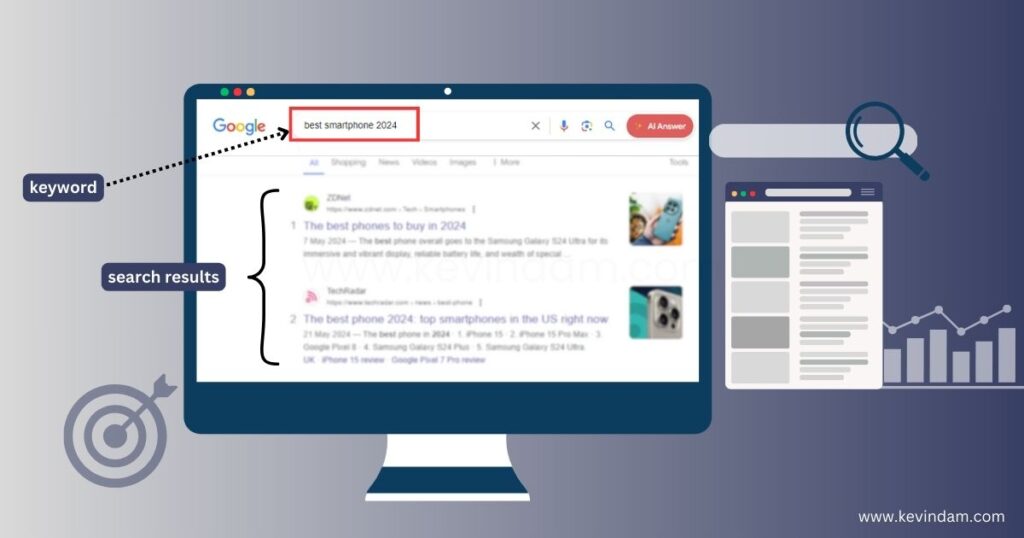
When we type a query into a search engine and hit enter, how quickly we get thousands of results feels magical. But have you ever thought about the process behind this digital sorcery?
Search engines like Google constantly analyse web content to determine which pages are most relevant to specific search queries. This process is driven by complex algorithms considering many factors when assigning rankings to web pages.
Let’s explore the inner workings of search engine algorithms and the crucial factors they consider while ranking web pages. Search engine algorithms can be compared to the secret recipe for a well-crafted dish. They carefully evaluate various aspects of web content, including the quality and relevance of the information, the credibility of the website, and the overall user experience it provides. These algorithms ensure users receive the most valuable and accurate information in response to their searches.
Key Factors Considered by Search Engine Algorithms
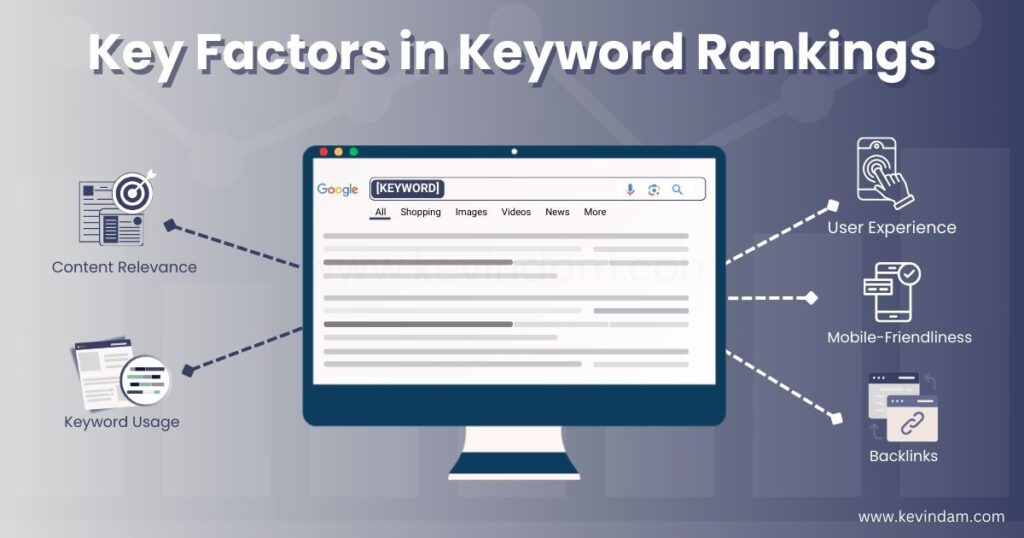
Search engine algorithms can be compared to the secret recipe for a well-crafted dish.
They carefully evaluate various aspects of web content, including the quality and relevance of the information, the credibility of the website, and the overall user experience it provides. These algorithms ensure that users receive the most valuable and accurate information in response to their searches.
- Content Relevance: Algorithms assess how well the content on a webpage matches the intent behind a user’s search query. Pages with highly relevant content are more likely to rank well.
- Keyword Usage: The frequency and placement of keywords within a webpage’s content significantly affect its ranking. However, overusing keywords can lead to penalties, so balance is key.
- Backlinks: The number and quality of other websites linking to a page signal its credibility and relevance. High-quality backlinks from reputable sources can positively impact rankings.
- User Experience Metrics: Factors like click-through rate, bounce rate, and time spent on a page provide insights into the overall user experience. Pages that engage and satisfy users tend to rank higher.
- Mobile-Friendliness: With the rise of mobile device usage, search engines prioritise mobile-friendly websites, especially after Google’s mobile-first indexing update.
Understanding these algorithms assists website owners in enhancing their online presence. Aligning strategies with these factors, websites can improve to meet search engines’ requirements for better results.
Now that we’ve explored how search engines assign rankings to web pages let’s shift our focus to understanding the impact of website performance on these rankings.
Website Performance Effect on Rankings
When considering a website’s performance, looking at various aspects influencing user experience and interaction is essential.
Page Loading Speed
One of the most critical factors is page loading speed. Research indicates that 40% of users abandon a website if it takes over 3 seconds to load, while 53% of mobile users expect a website to load in 2 seconds or less. These statistics underscore the vital importance of optimising page loading speed.
Google has confirmed that page loading speed is a crucial factor influencing search rankings. Faster-loading pages typically offer a better user experience and are often preferred by search engines. Therefore, prioritising improving page loading speed for every webpage is paramount for our website, which is dedicated to delivering an optimal user experience.
For instance, if our webpage takes 5 seconds to load compared to a competitor’s page that loads within 2 seconds, the competitor’s page would likely outrank ours due to its quicker loading time, assuming all other ranking factors were equal.
Another critical aspect of website performance impacting keyword rankings is mobile-friendliness.
Mobile-Friendliness
With an increasing number of people using mobile devices for internet browsing, ensuring our website is mobile-friendly is crucial. Search engines prioritise mobile-first indexing, predominantly using the mobile version of a site for ranking and indexing.
Therefore, if our site isn’t optimised for mobile devices, it may significantly impact keyword rankings.
Optimising for mobile-friendliness involves creating responsive designs, ensuring content is easily accessible and readable on various screen sizes, and minimising disruptive pop-ups or interstitials.
Prioritising these elements can enhance the overall user experience and improve keyword rankings.
Research also indicates that 53% of mobile users abandon sites that take longer than 3 seconds to load, emphasising the interconnected nature of page loading speed and mobile-friendliness in impacting keyword rankings.
Lastly, let’s discuss the role of overall user experience in influencing keyword rankings.
Overall User Experience

Website performance extends beyond technical factors like page loading speed and mobile-friendliness; it also encompasses users’ overall experience when interacting with our site.
Providing high-quality content, intuitive navigation, and engaging visuals all contribute to a positive user experience.
By prioritising these elements and consistently delivering an immersive and satisfying user experience, we can build trust with our audience and encourage them to spend more time on our site – both factors that search engines value when determining keyword rankings.
Optimising website performance requires a multi-faceted approach encompassing technical improvements and human-centred design strategies. By enhancing page loading speed, mobile-friendliness, and overall user experience, we can improve our keyword rankings while providing an exceptional browsing journey for our audience.
Significance of High Keyword Positions
High keyword rankings represent prime real estate in search engine visibility, with the highest chances of drawing in clicks and visits. When you’re sitting in one of those top spots, it’s like having a brightly lit storefront on a busy street – more people notice you, more people come in.
According to statistics, the first result on a search engine results page captures around 28.5% click-through rate on average, making it clear that being at the very top significantly impacts the amount of traffic you receive.
The first page is where most online users decide what they’ll click on. There’s a considerable drop-off after the first few results, so if you’re hidden away on the second or third pages, it’s like having a store in a quiet back alley.
Imagine this: You’re at a huge library looking for a book. You look at all the shelves, but pick one from the front shelf because that caught your eye first. People do the same thing when they search online.
It’s not just about how many people visit but also about who these people are. Securing high keyword rankings means they are much more likely to be interested in what you have.
Think of it this way: If you were selling sports equipment, there’s a big difference between having random people walk into your store and having athletes looking for gear coming in. Securing high keyword rankings is important to not just attracting a larger crowd but also ensuring that the right crowd comes by.
Consistently securing high rankings for top keywords leads to plenty of clicks, directly influencing how many potential customers or viewers see your website or content.
Considering these advantages, it becomes clear why aiming for high keyword rankings is crucial for obtaining traffic and engagement.
Now that we understand that securing high keyword positions is vital for attracting organic traffic let us explore techniques that can enhance and monitor SEO success.
Strategies for Boosting Keyword Rankings
Several key strategies can help improve your website’s visibility in search engine results pages (SERPs) when boosting your keyword rankings. Let’s explore effective strategies that can significantly impact your SEO success.
Keyword Research
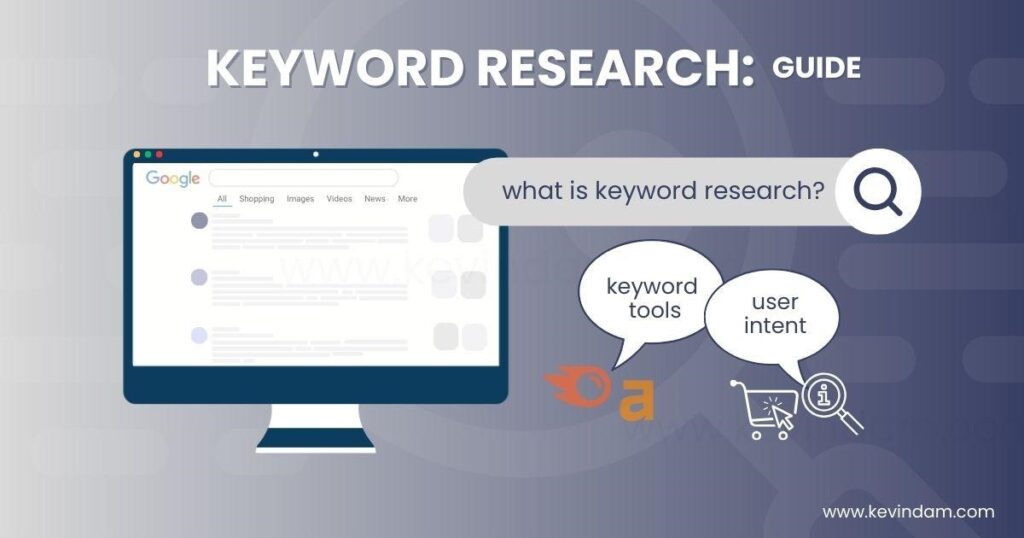
Effective keyword research is critical in maximising your SEO efforts and boosting keyword rankings. Let’s discuss the strategy we need to follow to accomplish this.
When it comes to SEO and keyword rankings, selecting the right keywords is crucial. You want to find search terms that people are looking for and then ensure your website is optimised for those terms.
Keyword research involves identifying relevant search terms that align with your target audience’s intent. The goal is to find high-potential keywords with manageable competition and significant search volume. It’s not just about finding any keywords; it’s about finding the right keywords to bring valuable traffic to your website.
For instance, if you run a business that sells handmade candles, you need to identify keywords that someone interested in buying handmade candles might use when searching online. These could include terms like “hand-poured candles,” “artisan candles,” or “natural wax candles.”
Effective keyword research also involves understanding the search intent behind each keyword. Some keywords indicate that a person is looking for general information, while others suggest they are ready to purchase. Understanding this intent helps you choose keywords that align with your content and business goals.
Keyword research is like detective work. Collect keywords, analyse search volume and competition, and use them to achieve your goals. Next, let’s explore leveraging keyword research tools and analytics effectively to uncover those high-potential keywords.
Engaging Content Creation
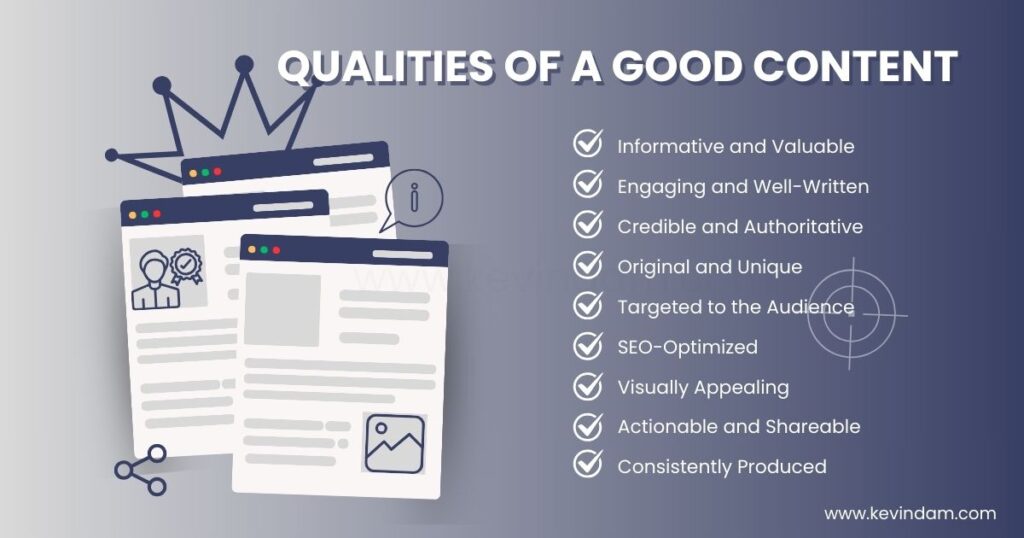
Creating valuable and engaging content is beneficial for audience engagement and is crucial in improving keyword rankings.
Well-crafted, valuable content naturally attracts links from other websites that find it informative or insightful, supporting improved keyword rankings over time. Content that resonates with your target audience has the potential to garner social shares across various platforms, impacting keyword rankings positively by signalling content relevance and quality.
These strategies form a solid foundation for enhancing keyword rankings and establishing a strong online presence. By leveraging on-page SEO best practices, quality link-building efforts, and engaging content creation, you can work towards achieving improved keyword positions and sustained organic visibility.
Use Best Practices on Your On-Page SEO
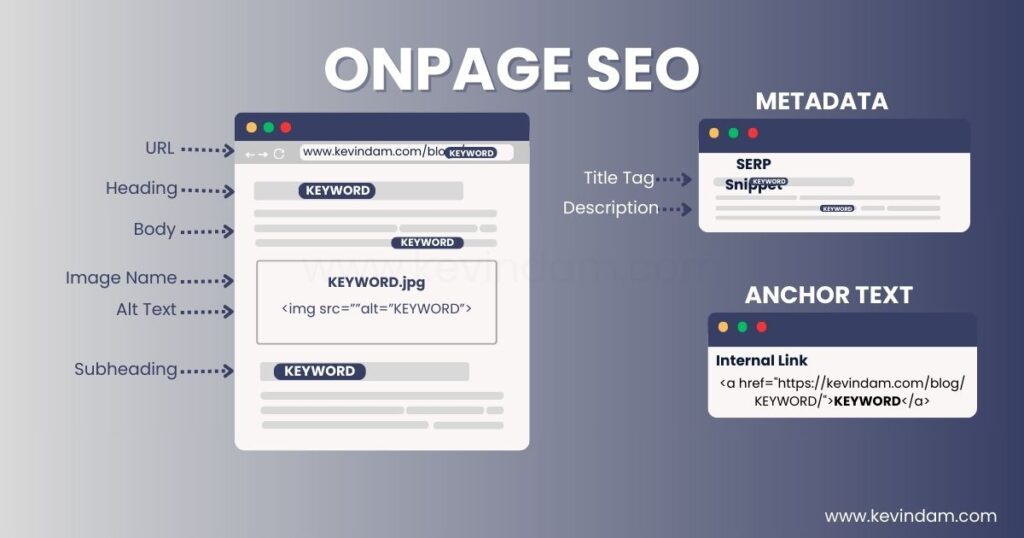
One fundamental strategy for improving keyword rankings involves implementing on-page SEO practices. This includes optimising various elements on your web pages to align with relevant keywords and phrases.
Key areas to focus on include crafting compelling meta titles and descriptions that incorporate targeted keywords and using relevant keywords strategically in headers and body content.
Successful implementation of these on-page SEO practices can greatly enhance a webpage’s visibility in search results, making it more likely to be discovered by users actively searching for related information.
Quality Link Building
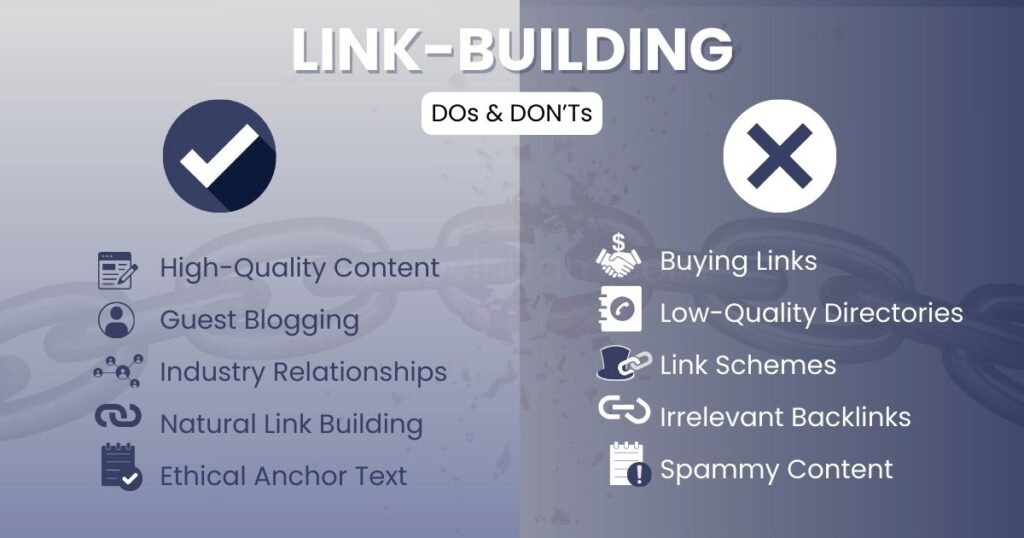
Another vital strategy for boosting keyword rankings is quality link building. When reputable websites link back to your content, search engines interpret this as a signal of trustworthiness and relevance.
It’s essential to focus on earning backlinks from authoritative websites within your industry and engage in relationship-building activities with other websites and content creators to foster natural link acquisition.
Acquiring high-quality backlinks from reputable websites can signal to search engines that your content is trustworthy and relevant, potentially boosting your keyword rankings and overall visibility in SERPs.
How to Craft Optimised Content for Rankings
When it comes to creating content that grabs the attention of search engines, it’s all about understanding what users are looking for and providing it to them in a clear and informative manner. Rather than just filling your content with keywords, it’s more about being useful and relevant.
One approach I find helpful is to put myself in the shoes of the user searching for information on a specific topic: What are they hoping to find? What questions do they have? Answering these questions helps fine-tune my content to be more valuable for the reader.
It’s crucial to strategically integrate target keywords into your content while ensuring it flows naturally within the text. This means including those keywords in headings, subheadings, and the main body of your article. However, it’s equally important to do just what is necessary. Excessive keyword usage can make your content seem unnatural or even spammy.
Addressing user search intent is paramount. Your content should precisely match what users sought when they entered their search query. To achieve this, you need to understand the results users anticipate when they type in specific keywords or phrases. Are they seeking comprehensive guides, quick answers, product reviews, or instructional videos? Your content should cater to these varied needs.
For instance, if someone searched for “how to clean a fireplace,” they would likely seek step-by-step instructions on effectively cleaning a fireplace rather than general information about fireplaces.
So, once you’ve identified the type of content that best addresses user intent, it’s time to provide valuable information that thoroughly addresses specific topics of interest to your audience.
This could involve creating comprehensive guides, how-to articles, original research pieces, or in-depth analyses covering every aspect of a particular topic. The goal here is to attract visitors and provide them with substantial and meaningful insights that keep them engaged and satisfied with the information provided.
Optimised content involves strategically integrating target keywords, addressing user search intent, and providing comprehensive, valuable information.
Tools for Tracking Keyword Success
When you’re dedicated to crafting top-notch content for your website, you’ll want to ensure that your hard work is paying off. That’s where tools like SEMrush, Ahrefs, or Google Search Console come into play.
These platforms offer invaluable insights that allow you to closely monitor your chosen keywords’ performance and, more importantly, how they stack up against the competition.
These tools track keyword rankings and serve as comprehensive dashboards for monitoring search visibility and overall site performance.
You can easily monitor fluctuations in your keyword rankings over time, identifying patterns and trends that can inform your content strategy. By analysing the performance of your keywords, you can determine which ones are driving the most traffic to your site and which might need some improvement.
Benefits of Using Keyword Tracking Tools
One major advantage of utilising these tools is obtaining detailed insight into competitor analysis. By understanding how your competitors rank for certain keywords, you can form a strategy to outperform them and secure a more prominent position in search results. This competitive advantage can bolster your online presence and draw in a larger audience.

For instance, if you notice that a competitor is consistently outranking you for a specific keyword, this insight can prompt you to review and refine your content strategy to regain a competitive edge.
These tools also provide valuable data on search visibility, offering metrics that gauge your website’s overall presence in search engine results. Understanding your site’s visibility helps you identify areas for improvement and fine-tune your SEO efforts to strengthen your online presence.
Impact of Tracking Keyword Performance
By closely tracking keyword performance, webmasters can refine their SEO strategies based on real-time data.
It enables website owners to understand which keywords resonate with their target audience and adjust their content accordingly. This proactive approach ensures content remains relevant and competitive in the ever-evolving digital landscape.
It’s essential to leverage these tools as part of an ongoing strategy for improving SEO performance and achieving sustained growth. Their insights enable us as website owners to continually adapt and optimise our content to stay ahead of the curve and drive increased organic traffic to our websites.
Using robust keyword tracking tools is a cornerstone for informed decision-making, ensuring that reliable data underpin every aspect of your SEO strategy. Embrace these utilities as allies in guiding your website towards sustained success.
Conclusion
Mastery of keyword rankings is crucial for increasing organic traffic and enhancing your website’s visibility. Applying effective strategies like thorough keyword research, creating high-quality content, and building links consistently can significantly improve your rankings. Keeping track of and refining your SEO efforts regularly using tools like SEMrush or Ahrefs will help you stay ahead of the competition and adapt to evolving algorithms. Remember, reaching the top keyword positions requires dedication and ongoing optimisation.
